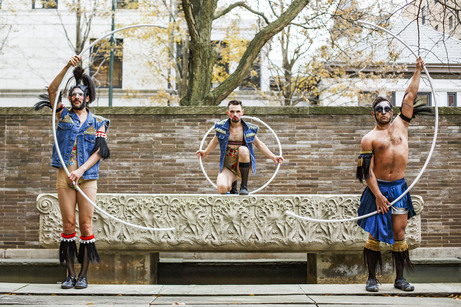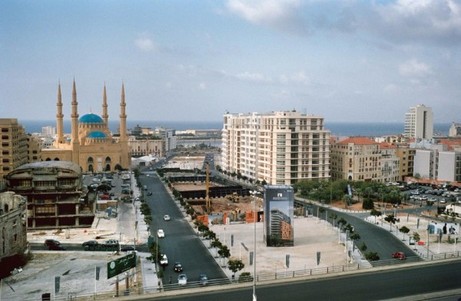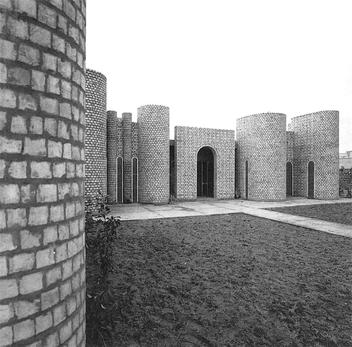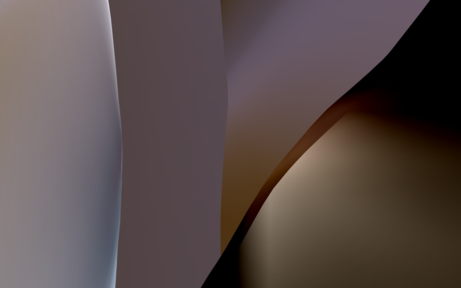Kjell Theøry
ATOM-r (Anatomical Theatres of Mixed Reality)
Jan 20, 2017 - Feb 04, 2017
(7pm)
Performance
The Graham Foundation is pleased to debut the world premiere of Kjell Theøry by the experimental artist collective, ATOM-r (Anatomical Theatres of Mixed Reality). The performance is the culmination of a multi-year project by the group and joint residencies at the Graham Foundation and the International Museum of Surgical Science (IMSS). Presented in the historic Graham Foundation ballroom, the immersive, multimedia performances will take place over three weekends between January 20–February 4, 2017. Given the intimate scale of the presentation, seating for each performance is limited.
Performances will take place at 7PM on the following dates:
FRIDAY JAN 20 & SATURDAY JAN 21
FRIDAY JAN 27 & SATURDAY JAN 28
FRIDAY FEB 3 & SATURDAY FEB 4
Tickets are $15 each ($12 for students). Proceeds directly benefit ATOM-r.
Kjell Theøry is an Augmented Reality performance juxtaposing the writings of Alan Turing—a gay twentieth century computing pioneer—about pattern and shape in the natural world with algorithmic mutations of Guillaume Apollinaire’s 1917 play The Breasts of Tiresias, a gender fluid spectacle for which the playwright invented the word “surrealism.” The performance considers the last two years of Turing’s life wherein he expanded his focus to include biology while seeking asylum and tolerance in Scandinavia following his prosecution for crimes of indecency in the United Kingdom. Turing named his theory of morphogenesis—the autonomous generation of flowers and other natural forms—for a Norwegian love interest, Kjell.
In Kjell Theøry, ATOM-r draws on Turing’s theory, turning it into a poetic and choreographic system to blur the boundaries between the binaries of physical and virtual space, past and future, male and female, and human and machine. The collective’s process creates a deeply entangled and fertile exchange between the live body and ubiquitously distributed data-driven systems. A project-specific ecology of source material is translated as movement, visualized on screens, and mapped onto bodies and geo-physical space through locative and computer-vision based augmented reality. The performance uses coded systems and augmentation to create a liminal theatre evolved in relation to the Graham Foundation’s specific spatial context. While the work is inherently variable, it is experienced as a tightly constrained, yet flexible, information pattern that allows for close attention, emergence, and interruption.
The Graham Foundation residency program invites practitioners working in a wide range of disciplines to directly engage the physical spaces of the Foundation’s historic Madlener House. Residencies encourage and expand the discourse around architecture by providing resources and opportunities for collaboration within the Graham Foundation community. ATOM-r’s residency began in September 2016 in collaboration with IMSS, where the group simultaneously developed an exhibition entitled Kjell Theøry: Prologue. The exhibition at IMSS will run from January 20–February 26, 2017.
ATOM-r (Anatomical Theatres of Mixed Reality) is a provisional collective exploring forensics, anatomy, and twenty-first century embodiment through performance, language, and emerging technologies. The work is interdisciplinary and evolves through large-scale projects with long durations of research and practice that generate outputs across a range of platforms including Internet art, augmented reality, site specific installation, choreographed movement, books, and objects.
ATOM-r was conceived in response to the historical architecture of early modern anatomical theaters, spaces designed for viewing human dissections and early surgical procedures. This physical and conceptual arrangement is used as a symbol throughout their work to explore histories and experiences of the body, sexuality, and prosthesis.
Kjell Theøry was created by ATOM-r core members: Mark Jeffery (choreography) and Judd Morrissey (text and technology) with Justin Deschamps and Christopher Knowlton (collaborators/performers); and features a guest appearance by Leonardo Kaplan.
Collaborators include: Grace DuVal (costumes); Laura Prieto-Velasco, Stephen Reynolds, Oli Watt (props/objects); Joshua Patterson (sound); and Josh Hoglund (lighting).
ACCOMPANYING EXHIBITION
Kjell Theøry: A Prologue
Anatomical Theatres of Mixed Reality (ATOM-r)
January 20, 2016 – February 26, 2017
International Museum of Surgical Science
1524 N. Lake Shore Drive, Chicago, IL 60610
ATOM-r is supported by a joint residency at the International Museum of Surgical Science and the Graham Foundation for Advanced Studies in the Fine Arts, with additional support from The School of the Art Institute of Chicago.

Beirut, Martyr’s Square, during recent redevelopment. Photo: Solidere.
The Arab City
Amale Andraos
Dec 15, 2016
(6pm)
Please RSVP
Amale Andraos will discuss her recent publication, The Arab City: Architecture and Representation co-edited with Nora Akawi, which engages contemporary architectural and urban production in the Middle East. Taking the "Arab City" and "Islamic Architecture" as sites of investigation rather than given categories, this book reframes the region's buildings, cities, and landscapes and broadens its architectural and urban canons.
Amale Andraos is Dean of Columbia University’s Graduate School of Architecture, Planning and Preservation (GSAPP) and co-founder of WORKac, a New York-based architectural and urban practice focused on re-imaging architecture at the intersection of the urban, the rural, and the natural. The practice has achieved international recognition for projects such as the Centre de Conferences in Libreville, Gabon and the Edible Schoolyard at PS216 in Brooklyn, NY. Her current projects include the Miami Collage Garage and a residential conversion of a historic New York cast-iron building. WORKac was named the AIA New York State Firm of the Year in 2015. Prior to Columbia, Andraos taught at universities including Princeton University School of Architecture, Harvard Graduate School of Design, and the American University in Beirut. Her publications include Architecture and Representation: The Arab City, co-edited with Nora Akawi, as well as 49 Cities and Above the Pavement the Farm! co-authored with her partner, Dan Wood.
The Graham would like to thank Perrier for supporting our public programs.
For more information on the exhibition, Every Building in Baghdad: The Rifat Chadirji Archives at the Arab Image Foundation, click here.

Jerusalem: Between Destruction and Obstruction
Nora Akawi
Nov 17, 2016
(6pm)
Talk
Please RSVP
In this presentation, Nora Akawi aims to situate today’s experience of Jerusalem, a city trapped in constant excavation, in relation to its interrupted modernization in the past, and the obstructed imaginaries for a future. Through a brief overview of different forms of digging in the city (for archaeological excavations, for foundations of large construction, but also the systematic plowing through inhabited homes and neighborhoods), Akawi will feature Palestinian urban resilience in the city in the face of the violent destruction of traces of the past and the obstruction of possibilities to plan for a future.
Nora Akawi is an architect based between Amman and New York. In 2012, she joined Columbia University’s Graduate School of Architecture, Planning and Preservation (GSAPP) as curator of Studio-X Amman, a regional platform for programming and research in architecture run by Columbia GSAPP and the Columbia Global Centers | Amman. At Studio-X Amman, she leads the conceptualization and implementation of public programs and research initiatives on architecture in the Arab Mashreq by curating conferences, workshops, publications, screenings, lectures, and other collective forms of production in partnership with researchers or institutions in the region. Since 2014, she has been teaching a graduate seminar course of theory and visualization focused on borderlands, migration, citizenship and human rights at GSAPP. She studied architecture at the Bezalel Academy of Art and Design in Jerusalem (B.Arch 2009). In 2011, she received her MS in Critical, Curatorial and Conceptual Practices in Architecture from Columbia GSAPP (MS.CCCP 2011), where she received the CCCP Thesis Award. Her thesis investigates the role of the archive in the formation of alternative political and spatial imaginaries in Palestine. She participates as Visiting Lecturer at Stockholm's Royal Institute of Art, in the Critical Habitats post-graduate program, and has served as critic in architecture programs at Columbia GSAPP, Barnard College, PennDesign, Harvard GSD, Georgia Tech, the Applied Science University in Amman, and GJU's SABE, among others. Publications include the book Architecture and Representation: The Arab City (co-edited by Amale Andraos, Nora Akawi, and Caitlin Blanchfield, Columbia Books on Architecture and the City, 2016), and "Jerusalem: Dismantling Phantasmagorias, Constructing Imaginaries" in The Funambulist: Militarized Cities (edited by L. Lambert, 2015).
Image: Road #4, photo by Omar Abdelqader
The Graham would like to thank Perrier for supporting our public programs.
For more information on the exhibition, Every Building in Baghdad: The Rifat Chadirji Archives at the Arab Image Foundation, click here.

Rifat Chadirji, Yasoub Rafiq Residence, Baghdad, 1965. Image courtesy of Rifat Chadirji.
Historic(ist) Encounters: Transforming Post-WWII Architecture in Baghdad
Amin Alsaden
Nov 09, 2016
(6pm)
Talk
Please RSVP
This presentation will examine the critical encounters that took place in mid-twentieth-century Baghdad between native architects and some of Modernism's most renowned figures who were brought to the city as part of country’s oil-fueled development campaign. Specifically, the buildings of Rifat Chadirji will be compared with Walter Gropius's proposal for the new campus of the University of Baghdad, as the two struggled to give shape to the ambitions of a newly independent Iraq. By reading both against the crisis of historicism declared by contemporaneous architectural historians, Alsaden will demonstrate how working in Baghdad created tensions that forced a radical shift in architectural practice.
Amin Alsaden is a PhD candidate at Harvard University whose work focuses on global exchanges of ideas and expertise across cultural boundaries. His research interests include modern architecture, especially in the Muslim and Arab worlds; questions of globalism and universalism in architectural history and design; governance and space in conflict zones; formal and cognitive attributes of interiors; sociopolitical and professional motives behind cultural institutions and districts; and monumentality in contemporary art and architecture. His dissertation investigates a crucible moment in post-WWII Baghdad, when a host of factors produced an unprecedented architectural movement characterized by a unique intellectual agenda and aesthetic, later exported to a modernizing Middle East; it aims to demonstrate the social role architecture played in a crisis-laden Baghdad, and how the creative class embraced a cosmopolitan ethos manifested in their output. Alsaden holds an MA from Harvard University, a post-professional MArch from Princeton University, and a BArch with a minor in interior design from the American University of Sharjah. He practiced at various firms in Europe and the Middle East, most recently at OMA and MVRDV in the Netherlands.
The Graham would like to thank Perrier for supporting our public programs.
For more information on the exhibition, Every Building in Baghdad: The Rifat Chadirji Archives at the Arab Image Foundation, click here.

Sara Ludy
Lampo Performance Series
Nov 05, 2016
(8pm)
Performance
Please RSVP
Sara Ludy premieres a new live audiovisual performance that arranges found imagery and field recordings into a rhythmic composition of otherworldly forms.
Ludy has worked with browsed images since 2000, generating works such as Low Prim and Postcards. More recently, she has collected pictures of natural disasters, tragedy and death, or what she calls “everyday horror.” In this special project, she alters these images until they become unrecognizable, blurring and shaping them into undulating 3D bodies and landscapes. Ludy also adds layered sound—manipulated recordings of AC hum and the buzz of traffic, trees, birds and insects captured from her workspace while browsing online. Tones rise and fall with the visual forms.
By combining materials from these dissimilar environments, and then filtering them through her inner world and intuitions, Ludy’s performance becomes an opportunity for the artist to expel the effects of image saturation through a meditative process.
Sara Ludy (b.1980, Orange, Calif.) is a Chicago-based artist whose practice investigates the confluence of the physical and virtual. Her practice incorporates photography, Second Life, animation, video, sound and live performance. Recent exhibitions include Museum of Contemporary Art Chicago, Chicago; bitforms gallery, New York; Postmasters Gallery, New York; Klaus von Nichtssagend, New York; Interstate Projects, Brooklyn; Eyebeam Center for Art and Technology, New York; Vancouver Art Gallery, Vancouver; Western Front, Vancouver; Kuenstlerhaus Bethanien, Berlin; Carroll Fletcher, London; Espace Verney-Carron, Lyon; and C-Space, Beijing.
This performance is presented in partnership with Lampo. Founded in 1997, Lampo is a non-profit organization for experimental music and intermedia projects. Support provided to Lampo by mediaThe foundation inc.
Image courtesy of Sara Ludy
The Graham would like to thank Perrier for supporting our public programs.






 PREVIOUS POSTS
PREVIOUS POSTS